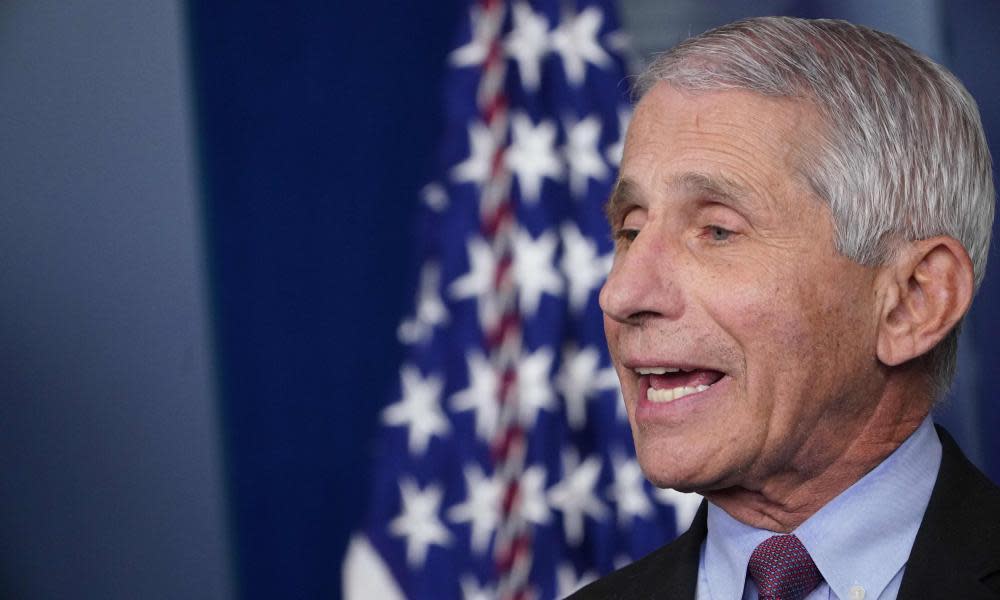Fauci: US to repeal anti-abortion rule on aid and join Covax vaccine scheme

The Biden administration will repeal anti-abortion restrictions on American aid and join the international vaccine-sharing scheme Covax, Anthony Fauci has announced in remarks signalling a major turnaround in US global health policy.
Fauci, the director of the National Institute of Allergy and Infectious Diseases, announced the changes in a speech to the World Health Organization on Thursday morning after being chosen to head the US delegation to the global health group in one of the first acts of Joe Biden’s presidency.
“President Biden will be revoking the ‘Mexico City policy’ in the coming days as part of his broader commitment to protect women’s health and advance gender equality at home and around the world,” Fauci told the group’s annual executive board meeting.
The Mexico City policy, also known as the “global gag rule”, bans foreign NGOs from performing or promoting abortions as a condition of receiving US family planning aid. Introduced by Ronald Reagan in 1984, it has been repealed by every Democratic president and reinstated by every Republican one since.
Donald Trump implemented a more stringent version of the ban, under which organisations that refused to sign on were cut off from receiving any health aid, including for HIV, nutrition, tuberculosis and malaria programmes.
One family planning group that refused to sign the agreement, Marie Stopes International, lost $30m a year in funding, money it says would have helped to prevent an estimated 6m unwanted pregnancies, 1.8m unsafe abortions and 20,000 maternal deaths.
In warm remarks intended to turn the page on the hostile attitude of the Trump administration to the global health body, Fauci paid tribute to the WHO’s “relentless” work and to his “dear friend”, the director-general Tedros Adhanom Ghebreyesus, in fighting the pandemic. Tedros, in turn, called him “my brother Tony”.
Fauci said letters had been delivered to the group to formally retract the process of US withdrawal from the WHO that Trump had announced last May after declaring it was too “China-centric” and disproportionately funded by the US to no benefit. The US would cease drawing down staff seconded to the WHO and resume direct engagement with the group, he added.
“I am honoured to announce the US will remain a member of the WHO,” Fauci said. “The US also intends to fulfil its financial obligations to the organisation.”
The Biden administration’s chief medical adviser also formally announced that the US was signing up to Covax, a programme that pools international funds to buy vaccines and equally distribute them around the world, as well as to the Access to Covid-19 Tools Accelerator (Act-Accelerator), a framework for collaboration on treatments and technology.
Trump has spurned Covax, but in its most recent Covid-relief package the US Congress reserved nearly $4bn (£2.9bn) for Gavi, the organisation that co-founded the programme, which was widely seen as intended to support the vaccine-sharing platform.
Its formal membership opens the door to more funding and direct donations of vaccines, and builds momentum for the programme and wider efforts to guarantee equal access to vaccines, treatments and technology to fight the pandemic.
Wealthy or upper-middle income countries have bought up more than 5bn vaccine doses so far, compared with about 680m in lower-middle income and poor countries. The imbalance suggests global vaccine supplies will remain insufficient until at least 2023 or 2024, according to a Duke University analysis.
Covax is intended to redress that inequality but has been undermined by countries striking their own side deals that push up prices and constrain supply.
Tedros on Monday said the world was on the edge of a “catastrophic moral failure” in the distribution of vaccines, with just 25 doses delivered in one poor country so far, Guinea, which administered the Russian Sputnik vaccine this month to people including its president.
Meanwhile, more than 39m vaccinations have been given across 49 countries who made their own deals.
Covax is set to deliver its first doses next month, and the programme says it will provide enough vaccines for 2bn inoculations this year, which it says is enough to immunise 20% of its member countries’ populations.
Fauci called on Thursday for transparency in the ongoing investigation into the origins of the virus that causes Covid-19, now being examined by a team on the ground in Wuhan, China, where the first outbreak was detected. “The international investigation must be robust and clear, and we look forward to evaluating it,” he said.
He also signalled a renewed US commitment to cooperation in fighting the pandemic, which has been marred by the nationalistic approach of the Trump administration and the hoarding of vaccines and treatments.
“The US stands ready to work in partnership and solidarity to support the international Covid-19 response, mitigate its impact on the world, strengthen our institutions, advance epidemic preparedness … and improve the health and wellbeing of all people throughout the world,” Fauci said.
Tedros congratulated the Biden administration after the speech. “This is a good day for the WHO and a good day for global health,” he said.
Jeremy Farrar, the director of the medical charity Wellcome, said the US commitment to Covax and the WHO was “brilliant news”, and urged the Biden administration to immediately invest in the Act-Accelerator.
“Strong US collaboration on the international stage will be key to ending this pandemic as quickly as possible and improving the lives of millions of people worldwide,” he said. “US science has been at forefront of global health for decades and health leaders in the US bring tremendous technical expertise, leadership and influence.

 Yahoo Movies
Yahoo Movies 
